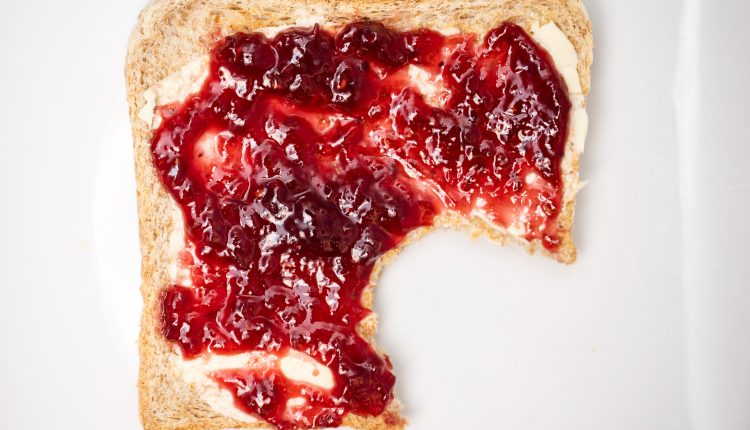Have you ever stood in the grocery store aisle, faced with countless amounts of fruity spreads, and wondered about the difference between jam and jelly?
Many people use these terms interchangeably, but there are actually distinct differences that set these two delicious condiments apart.
Here’s an exploration of the differences between jam and jelly — so you can confidently select the perfect spread for your next peanut butter and jelly sandwich:
EASY TIPS FOR COOKING WITH WHOLE AND DICED PUMPKIN, PLUS A UNIQUE TAKE ON JAM
- Ingredients and preparation
- Texture and appearance
- Taste and uses
Jam
Ingredients and preparation
Jam is a delightful concoction created from the vibrant essence of crushed or puréed fruit, encompassing not only the succulent flesh and juice but often the zesty peels, too.
This unique blend imparts a distinctive chunky and textured appearance to the jam, making it visually appealing to the palate.
To achieve the perfect balance of sweetness and preservation, jam combines fruit and sugar in roughly equal proportions, harmonizing nature’s sweetness with the necessary preservation elements.
In addition to the fruit and sugar, pectin plays a pivotal role in crafting the delectable consistency of jam.
Some fruits inherently possess pectin, a natural gelling agent that aids in the setting process. In cases where pectin levels are insufficient, additional pectin may be introduced to attain the desired thickness, ensuring that every spoonful of jam is a delightful experience.
Texture and appearance
Jam has a distinctive texture that is both chunky and delightfully spreadable, owing its unique character to the incorporation of fruit pulp and small fruit pieces.
This creates a rustic and homemade appeal, making it a beloved choice for those who relish a more textured experience.
‘STEAK AND JELLY, PLEASE,’ AMERICANS TELL UBER EATS — AND OTHER ODD AND POPULAR CUSTOMER REQUESTS OF 2023
The color of jam can exhibit a charming variety, influenced by the type of fruit utilized in its creation. Often, it retains the natural shade of the fruit, resulting in a slightly cloudy appearance that adds to its visual charm, reflecting the authenticity of the fruits used.
Taste and uses
Jam is a culinary delight that captivates the taste buds with its distinctive flavor profile. It retains the natural, full-bodied essence of the fruit chosen for its creation, often delivering a delightful interplay of sweet and slightly tart notes.
The texture of jam adds to its appeal, offering a pleasing contrast between the smooth gel and the occasional bursts of fruit pieces, creating a sensory experience many find irresistible.
Beyond its delectable taste and texture, jam is incredibly versatile in its culinary applications. It can be generously spread on warm toast or scones, served as a sumptuous filling for pastries or add a burst of fruitiness to various dessert recipes, making it a cherished addition to a wide range of culinary creations.
Jelly
Ingredients and preparation
Jelly is a culinary creation derived exclusively from fruit juice rather than the whole fruit.
The fruit juice is strained to eliminate any solids, yielding a product with a strikingly clear and silky-smooth texture.
While both jam and jelly incorporate sugar to sweeten their flavors, jelly boasts a notably higher sugar-to-fruit juice ratio, imparting a sweeter profile to this spread.
To achieve its gel-like consistency, jelly needs a more generous infusion of pectin compared to jam, due to its lack of the natural pectin found in the fruit itself. This additional pectin is the ingredient that distinguishes jelly from its counterparts.
Texture and appearance
Jelly sets itself apart with its smooth and gel-like texture, a stark contrast to the chunkier consistency of jam.
This quality makes jelly effortlessly spreadable and lends it a uniform appearance devoid of any fruit pieces. Its texture is designed for a consistent, silky experience that appeals to those who prefer a more refined and even spread.
In addition to its unique texture, jelly boasts a characteristic clarity in color.
It is typically translucent and clear, allowing light to gracefully pass through, evoking a jewel-like appearance that sets it apart, adding to its visual allure and lending a touch of elegance to this beloved spread.
Taste and uses
Jelly offers a taste experience that leans to the sweeter side, characterized by a clean and focused fruit flavor. This heightened sweetness and clarity result from its exclusive use of fruit juice, excluding the fruit’s solid components. The result is a taste that’s both luscious and unmistakably fruity, appealing to those who favor a more intense fruit sensation.
When it comes to culinary applications, jelly finds its perfect fit in various roles. It is an ideal choice for spreading on morning toast, adding a delightful touch to thumbprint cookies or serving as a glossy and flavorful glaze for meats and poultry, thanks to its exceptionally smooth consistency, enhancing the flavor of both sweet and savory dishes.
While jam and jelly both serve as delectable spreads, their differences are evident in their ingredients, texture, appearance, taste and culinary uses. Your preference for jam or jelly will largely depend on your taste and the specific application.
Whether you’re a fan of the chunky, fruit-filled goodness of jam or the smooth and sweet allure of jelly, these delectable condiments will continue to add a touch of fruity delight to your culinary adventures.
So, the next time you reach for a jar of fruity goodness, you’ll know precisely what sets jam and jelly apart.
For more Lifestyle articles, visit www.foxnews.com/lifestyle.
Read the full article here

